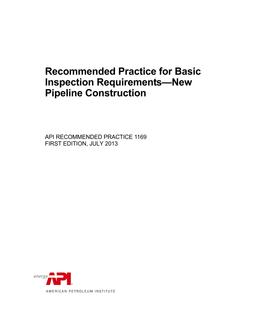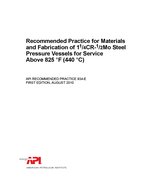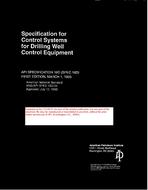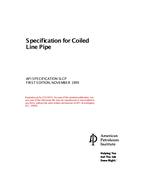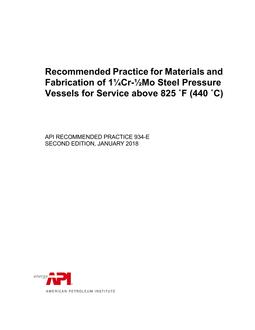
API RP 934-E
Click here to purchase
This recommended practice (RP) includes materials and fabrication requirements for new 1¼Cr-½Mo and 1Cr-½Mo steel pressure vessels, including heat exchanger shells and channels for elevated temperature service. It applies to vessels that are designed, fabricated, and documented in accordance with ASME Code Section VIII, Division 1, or Division 2 (hereafter referred to as “Code”).
This document may also be used as a resource when planning to modify existing pressure vessels.The interior surfaces of these pressure vessels and heat exchangers (i.e. the surfaces exposed to the process) may or may not have an austenitic stainless steel (SS), ferritic SS, or nickel alloy weld overlay or cladding to provide additional corrosion resistance.
This RP is primarily intended for wall thicknesses less than 4 in. (100 mm), and a preferred option for thicker components is to use 2¼Cr-1Mo alloys.
This RP is applicable to shell thicknesses greater than 1 in. (25 mm). Although outside of the scope, this document can be used as a resource for vessels down to lower shell thicknesses with changes defined by the purchaser.
This RP is intended for use for 1¼Cr-½Mo and 1Cr-½Mo equipment operating between 825 °F (440 °C) and 1150 °F (620 °C). The primary in-service materials degradation mechanism addressed by the requirements herein is low creep ductility (LCD) cracking, which can occur at these operating temperatures if not properly addressed. LCD cracking is a form of reheat cracking.
Typical equipment covered by the scope of this RP includes catalytic reforming reactors and fluidized catalytic cracking (FCC) unit hot wall reactors.
Product Details
- Edition:
- 2nd
- Published:
- 01/01/2018
- Number of Pages:
- 27
- File Size:
- 1 file , 350 KB
- Redline File Size:
- 2 files , 3.5 MB
- Product Code(s):
- C934E02, C934E02, C934E02, C934E02, C934E02, C934E02
- Note:
- This product is unavailable in Cuba, Iran, North Korea, Syria
